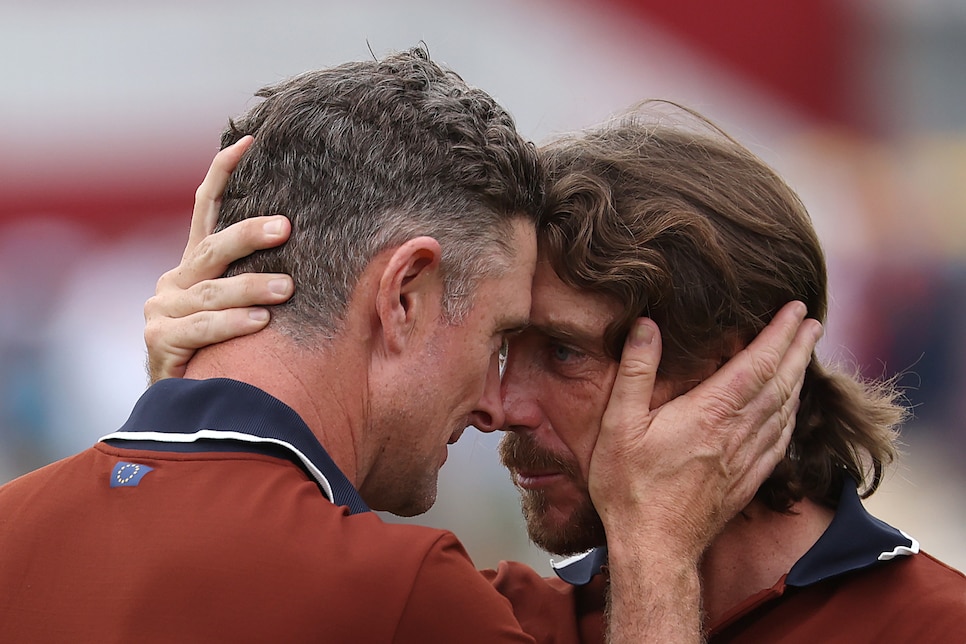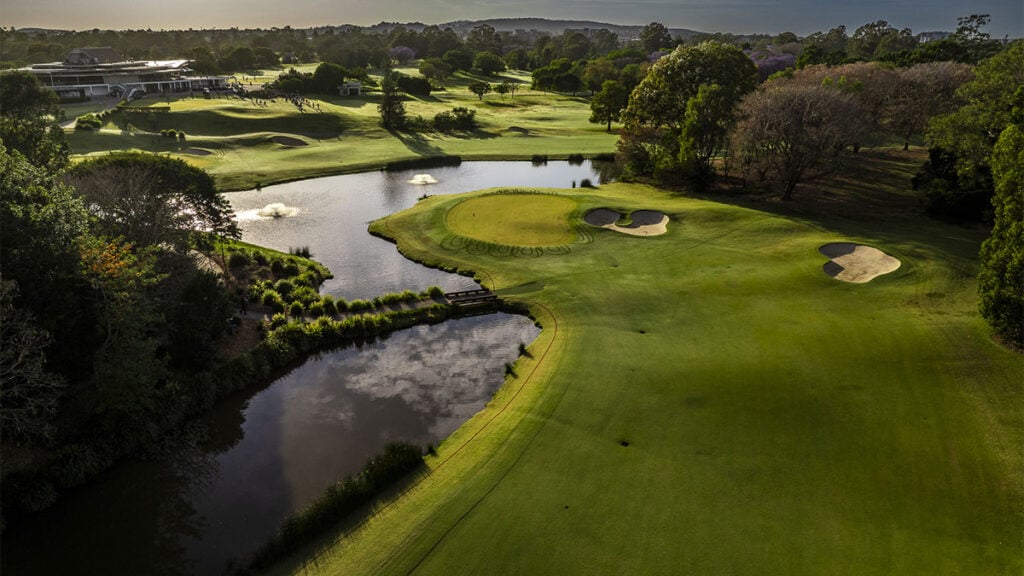It was an innocuous answer to a question about putting. Yet five words Justin Rose said on Sunday have stuck with me for what they say about the 2025 European Ryder Cup team.
The 45-year-old Rose was brilliant on the greens all week at Bethpage, leading all 24 players in strokes gained/putting, and my colleague Luke Kerr-Dineen asked him why. Rose shrugged and said he couldn’t explain it.
RELATED: Justin Rose’s strong form makes him more than Europe’s sage mentor
“I wish I knew,” he said, with a celebratory beer resting next to his microphone. “I wish I could be a bit more selfish and know that 25 weeks of the year. But do you know what I feel like the power of this [pointing at his teammates], the power of the group, who knows what it is, that ability to lock in, the ability to just want it that little bit more.”
Then he paused.
“But the answer to your question is: I don’t know, other than the badge and the boys, honestly. That’s all that matters, honestly, the badge and the boys.”
Rory McIlroy, draped in a European flag and sitting in front of Rose, nodded and said, away from his mic, “The badge and the boys, I like that.”
Those five words from Rose echoed through the rest of a press conference that was full of laughs, some tears and players clinking their drinks. I thought back two years, to a Friday night in Rome when Rose rolled in a 10-foot putt on the final green to prevent the US from winning a single match on the first day of the 2023 Ryder Cup. You might remember the putt. Do you remember the celebration?
Rose turned to his teammates, lining the edge of the green, and pointed at each of them.
“You, you, you!” he screamed, dedicating his half point to his 11 European teammates. He then beat his chest, slamming his right hand against the European team badge.
His message that day was the same as it was Sunday in New York.
The reason it resonated so strongly with me is because I saw it myself at Bethpage Black last week.
It struck me for the first time on the Monday. Keegan Bradley led his US team through the tunnel to the first tee, without their clubs, to soak up a moment together. They listened to the national anthem performed incredibly by New York City firefighter Bryan Robinson, and heard the moving words of Chris Mascali, a fire lieutenant who lost his father on 9/11.
The only time you’ll hear the European anthem – ”Ode To Joy”, before you ask – is at the opening ceremony. Ask the 12 players on Team Europe to name the anthem and I doubt the majority would know.
After watching Bradley and his team on the first tee that morning, I realised that the Americans were seeking to draw inspiration from the identity of their country. It may seem extremely obvious, but I think it’s prescient to what I would realise on Sunday night.
The US team feels the need to represent their country while the European team seeks to draw inspiration only from those who have played before them. They don’t seem to be interested in playing for a country. They play for each other. They seem inwardly rather than outwardly motivated. As much as the Europeans represent their continent, and wear their flag, they ultimately feel a responsibility to those who built Team Europe.
I believe this plays out on the course.
The US players came out on Friday morning, each carrying an American flag, to the sound of “Born in the USA” and “Coming to America”. They led chants of “U-S-A” and waved their flags. The patriotism was clear. But was it productive?
When putts dropped for the Americans, players would look to the crowd and encourage them to cheer more. They would walk off the greens in tow with their partners.
When putts dropped for the Europeans, they turned to find their partner. There was pointing, there was hugging, there was laughing. They appear to have a bond that the US team is searching for.

Photo: Jamie Squire
Every two years, everyone in golf attempts to quantify why the European team, underdogs on paper, seem to have success in this unique format of team golf. Rose, himself, was asked about it in Rome.
“We are united by a culture and we are united by a generation of players that have come before us.” he told us on the back of a five-point European victory. “This is our time. Luke [Donald] has been very clear on that message, this is our time to shine, not because this is our stage, we are just taking care of it because of the amazing role models that we’ve had before us that have shown us how to do it.”
There’s no reference to Europe or a shared sense of responsibility to represent a country or continent.
RELATED: Europe’s Captain Everything reaches legend status, solidifies his place in history
“There’s a really strong culture on the European team. A good pairing on the European team doesn’t mean playing with your best mate. You know, it means representing something bigger than yourself, and I feel like that’s, for me, what being a European Ryder Cup player is all about.”
Fast forward two years and Rose again sat in a winning Ryder Cup press conference, the fifth time he’s done that, and while the question was directly about his team’s motivation, his answer got there.
The badge. And the boys. In that order. Represent the team. Do your teammates proud. Don’t worry about anything else. That’s what is important. That’s how to be successful.
And with 11 wins in the last 15 Ryder Cups, it’s working.




